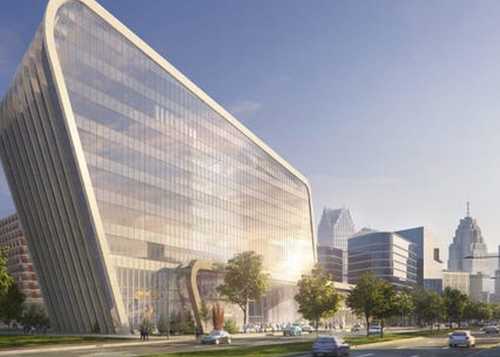
UM innovation center planned for the fail-jail site on Gratiot.
Opinion by Craig Regester, Stephen Ward and Marion Van Dam
The authors, University of Michigan faculty, run the Semester in Detroit program, where students foster "reciprocal relationships" with the city's people, organizations and neighborhoods.
On Oct. 30 in downtown Detroit, UM President Mark Schlissel joined Detroit Mayor Mike Duggan and billionaire developers Dan Gilbert and Stephen Ross to announce a partnership for a project estimated to cost up to $750 million.
Their plan is to establish a "Detroit Center for Innovation" on the now infamous “failed-jail site” to train the next generation of college graduates. UM would offer masters degrees and “stackable certificates” for professionals who would serve the emerging high-tech economic system, building capacities in areas such as artificial intelligence and cyber-security, emerging fields in what some have called the rise of “surveillance capitalism.”
As reported by Detroit Free Press business columnist John Gallagher, the planning for this project occurred almost exclusively behind private, closed doors with no input from longtime Detroit residents, community institutions or city council.
Semester in Detroit is making this public statement because we feel it is important for our community partners, colleagues, alumni, current and future students, and donors to know where we stand. We present below a series of questions that we hope will be discussed widely and openly as more people interrogate this proposal and contemplate what this announcement signifies for the university’s priorities and its many long-term relationships in Detroit.
The city of Detroit is important -- both historically and contemporarily -- for understanding the complex and inextricable conflicts created by capitalism’s dependency on racial and economic oppression and inequity.
While such conflicts have been present since colonization of the original Anishinaabe lands that became “Detroit,” we need only look back a few years, or even weeks, to see how white billionaires continue to “reimagine” majority-black Detroit in their own image and for their own economic benefit. Given this history, and considering the private interests involved in this partnership, we believe the “Detroit Center for Innovation” is an inappropriate and irresponsible deployment of the university’s social, economic and intellectual capital.
We have four questions that we hope will generate a much-needed and broadly participatory public conversation about this proposal:
-
Wayne County taxpayers have paid over $150 million toward the ill-conceived and corruptly executed “failed-jail” project on the land to be developed for the proposed "Detroit Center for Innovation." Dan Gilbert became the owner of this land in a controversial deal with Wayne County in April 2018 in which he agreed to build the new Wayne County jail northeast of downtown in exchange for this and other nearby publicly-owned parcels in downtown Detroit. (See the Detroit Justice Center’s Wayne County Jail Fact Sheet and the No New Jails Detroit Coalition.) Given this land deal and recent reports of Dan Gilbert’s alleged abuse of federal tax benefits, is this project attempting to manipulate UM as a public institution to benefit private interests at the expense of the general public? Through this partnership, could UM be enabling tax avoidance and the inappropriate use of federal Opportunity Zones?
-
Many recent major development projects in Detroit have skirted, abused or manipulated the spirit and legal requirements of Detroit’s community-benefits ordinance. Regardless of what is legally required under the city ordinance for this proposed project, how will UM proactively and strategically prevent dislocation and prioritize genuine and generous community benefits for long-time Detroiters? Will benefits be guaranteed for long-time Detroiters, not only in the planning and construction of this project, but in the eventual education and teaching that will occur within the newly built UM classrooms? Broadly speaking, will UM recognize the voices, concerns, and visions of local residents, such as the concrete proposals recently put forward by east side communities? Or, will UM be complicit in the dangerous practice of the wealthy and powerful alone determining the direction of development?
-
The land for this project encompasses the boundary between the historic black neighborhoods of Black Bottom and Paradise Valley, which were strategically destroyed by the city of Detroit, in conjunction with the federal government, in the mid-20th century. How will these community histories and legacies be honored and empowered without tokenism and cultural cooptation? And, who will decide?
-
In the past 25 years, a growing number of UM faculty and staff have put energy and thought into practicing principles of engagement with Detroit and Detroiters that are based on respect, mutual benefit, and a commitment toward social justice. With the proposed “Detroit Center for Innovation”, is UM co-opting this work to promote a project devised by private, profit-seeking investors that will by-pass the residents of Detroit and communities they live in, thereby perpetuating the historically fraught and problematic record of the University of Michigan in the city?
These questions reflect the type of critical thinking and analysis we promote among students and the broader Detroit communities of which we are a part in the Semester in Detroit program.
We do not ask these questions in an academic vacuum. Rather, we have always tried to hold ourselves and our institution accountable to our underlying commitment to social justice for the people and communities of Detroit. It is in this spirit that we publicly ask our own institution to seriously engage in these critically important questions.
For more information about the authors' response to the “Detroit Center for Innovation,” you can email faculty director Stephen Ward at smward@umich.edu.











